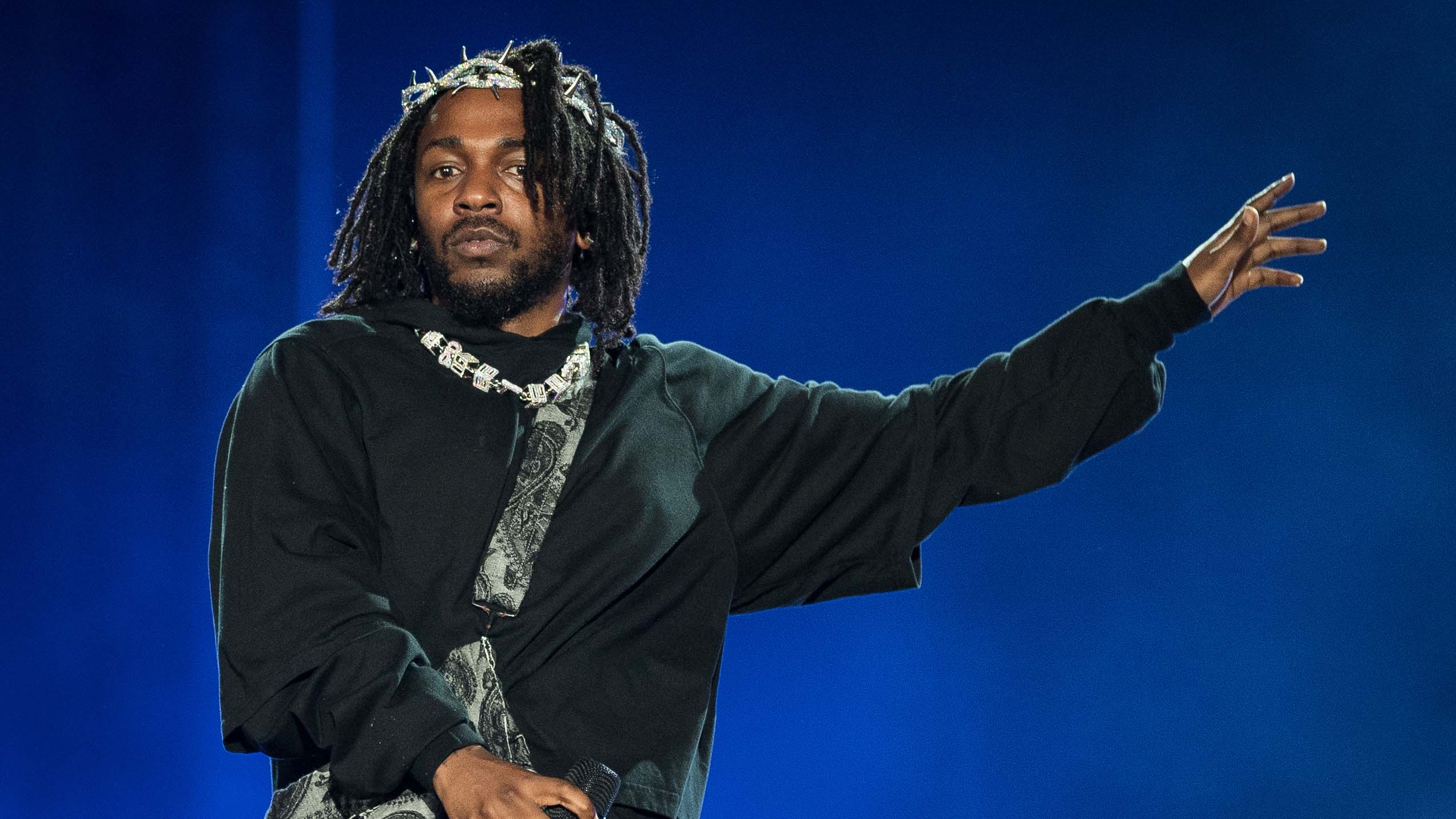Making Kendrick Lamar's Mr. Morale & The Big Steppers: "We've got no boundaries anymore. We can do whatever we want, whenever we want, however we want it"
Best of 2023: We dive into the key moments of sampling and production that shaped Kendrick Lamar's deeply confessional fourth studio album

Want all the hottest music and gear news, reviews, deals, features and more, direct to your inbox? Sign up here.
You are now subscribed
Your newsletter sign-up was successful
Join us for our traditional look back at the news and features that floated your boat this year.
Best of 2023: Kendrick Lamar's fourth studio album is not always an easy listen. A deeply ambitious project that narrates the Compton rapper's process of accepting and, through therapy, overcoming deep-rooted trauma and a sex addiction that has repeatedly damaged his relationship with long-term partner Whitney Alford, it never swerves the heavy stuff.
Whether it's exploring generational cycles of abuse on Mother I Sober or rapping about the need for "grown men with daddy issues" to "give the women a break" on Father Time, Mr. Morale & The Big Steppers is laden with difficult subject matter.
The heavy creative role played by rapper and alleged abuser Kodak Black confounds this issue, and contributes to the record's concerted attempt to deconstruct the Kendrick God complex — as he raps in Savior, "the cat is out the bag, I am not your savior". It's an important point in a world of unchecked, tribal celebrity idolisation, but ultimately the result can be difficult to stomach.
The sonic atmosphere created across the record is crucial when it comes to developing this narrative and conveying the fact that, as Kendrick's first words on the project sum up, "I've been going through something". From the moody, stunted old afro-funk sample that forms the beat for Worldwide Steppers to the disjointed piano chimes and harrowing domestic argument featured in We Cry Together, it's an album shaped by dark sounds and disturbing images.
Just like he did with the experimental jazz-rap fusion of To Pimp A Butterfly or the moral dilemmas and twisted street stories of good kid, m.A.A.d city before it, the LA rap icon challenges the listener, his dives into murky, uncomfortable waters only boosting the power of his storytelling. Unsurprisingly, production plays a huge role here.
While many rappers treat the creative process like an assembly line, Kendrick opts for a more collaborative approach
To create Mr. Morale & The Big Steppers, Kendrick Lamar enlisted a wide range of producers, engineers, and instrumentalists, many of whom he's been working with for a decade or more. The key names that crop up repeatedly on the credits list are DJ Dahi, Beach Noise, Sounwave, and J.LBS. And while many rappers treat the creative process like an assembly line – a producer will send over a beat, they'll write a verse to it, then head to the studio, before an engineer delivers the finishing touches – Kendrick opts for a more collaborative approach.
Want all the hottest music and gear news, reviews, deals, features and more, direct to your inbox? Sign up here.
"A lot of artists that I've worked with write to the beat first," said long-time Kendrick producer Dj Dahi to Rolling Stone last year. "We create like a band. Literally all together working and jamming. Certain people in the room kind of add a certain taste or a certain outlook on music. So it created a melting pot of interesting drum grooves or interesting sample choices or interesting styles of playing. Then you get a pool of ideas that feels a little bit unexpected."
That process allowed producers like Dahi and South London multi-disciplinarian Duval Timothy, the jazz pianist responsible for keys on four tracks, including the eerie, ploddingly melodic Crown, to shift away from the formulaic structures that dominate a lot of rap music.
But like other album contributors outside of Kendrick's core team, Timothy's involvement in the final project wasn't always a sure thing — until the release date, when he sat hastily refreshing streaming sites at midnight, he didn't know which of his contributions would make it onto the project, if any made it at all. "I was just so happy that you could hear me in it, my style of piano," he told Pitchfork. "He wanted me for me."
Mr. Morale's opening track United in Grief, which Timothy played a major role in shaping, is a complex, intricately-woven four-minute introduction to the album's key themes and motifs, which lurches from an ominous choral opening, to a jumpy verse of piano stabs and staccato raps, then an intense, high-tempo breakbeat section peppered by breathless spitting and swooping strings.
The track begins with a sample of Chicago producer Tim Maxey's PARADISE (released under the moniker NOT THE TWOS), with Maxey's main vocal hook isolated to create an expansive choral opening, one that instantly introduces the record's primary themes of mental struggle and trauma processing — "I hope you find some peace of mind / In this lifetime", he sings.
That sense of psychological turbulence is enhanced by the controlled chaos of the breakbeat drum loop that follows, produced by Sounwave (another Compton beatmaker with strong ties to Lamar). "We started with the drums first," Sounwave told Consequence.
"We were just freestyling, throwing paint at the wall. And I remember just chopping up these drums in my own little world. But other than that, everything else was probably chord-driven at the beginning." The result is a densely syncopated beat that reflects Kendrick's jazz influences, showcased within a track that melds multiple creative minds in an innovative fashion.
The same could be said for the third song on Mr. Morale, Worldwide Steppers. Built around a looped three-second sample of the intro to Nigerian afro-rock group The Funkees' 1974 track Break Through, it plunges you into a moody, immersive funk like nothing else on the album, creating a dark hole in which Lamar lists in painful detail the times he's cheated on partner Whitney.
Repeating the refrain "I'm a killer, he's a killer, she's a killer, bitch / We some killers, walking zombies tryna scratch that itch", he uses the beat's overwhelming sense of tension and unrest to unpack some troubling confessions. His statement "I am not for the faint of heart", spoken matter-of-factly in the track's first verse, certainly seems accurate.
The only relief comes midway through when, brilliantly, ten seconds of 1970s soul band Soft Touch's Look Up, Look Down is stitched in, Kendrick's flow continuing uninterrupted as the old Sundance Records track's sweet guitar lick and gliding ride cymbals float in and offer a brief respite. However, it's not long before we're launched back into the dark Funkees-founded rhythm that preceded it, and the breadth of sound accomplished by producers J.LBS, Sounwave, and Tae Beast is emphasised.
Worldwide Steppers is a clear indication of how far the Mr. Morale production team skirted for samples, influences, and creative ideas. Speaking to Complex recently, Sounwave stressed the importance of this open-minded approach: "It's mainly just having no boundaries anymore. The fact that we can do whatever we want, whenever we want, however we want it, that allows us to think bigger. We can get any type of instrumentation we want and make it our own."
That concept seeps into one of the record's most commercially successful releases, a track that couldn't be more different from Worldwide Steppers: Die Hard. Featuring Bajan singer Amanda Reifer, LA vocalist Blxst, and the smooth bass playing of versatile Californian instrumentalist and singer-songwriter Thundercat, the record's third single is clean, linear, and poppy, providing the light to the previous track's shade.
From the off, there are parallels with LOVE, the Zacari collab featured on DAMN.; there's a light, soulful male hook (provided in this instance by Blxst, who broke his usual pattern of making music solo to record the track in Lamar's studio), a set of expansive, echoing percussion sounds, and a lyrical focus on love and trust.
But despite sounding like a relatively upbeat pop song, Die Hard is scattered with lyrics that, if placed elsewhere on the album, would sound far more confessional; "My truth too complicated to hide now", Lamar raps, before finding even greater vulnerability with the line "Can I open up? Is it safe or not?" And when you dig beneath the surface instrumentally, things get even more interesting.
The fact that we can do whatever we want, whenever we want, however we want it, that allows us to think bigger. We can get any type of instrumentation we want and make it our own
Sounwave
Die Hard's main melodic backdrop is eked out of a short vocal line, sampled from US singer and composer Kadhja Bonet's 2015 single Remember The Rain and stretched out by producers Dahi, FNZ, J.LBS and Sounwave to create a haunting, high-pitched melody. Bonet's chorus, a beautiful, ghostly soprano vocal performance, is chopped and treated with a low-pass filter, becoming a sustained, muffled sound that provides structure and allows the song's heavily-textured vocal performances to take centre stage.
And here, there are some playful touches, from Reifer's opening line "Shimmy, shimmy, cocoa puff", a reference to Little Anthony & The Imperials' 1960 track Shimmy, Shimmy, Ko Ko Bop, to Blxst's line "I hope you see the God in me", which seems to contradict the album's broader motive of deconstructing the image of Lamar as the people's 'savior'.
Hip-hop sampling's unrivalled ability to create captivating textures and sounds out of totally unexpected sources is at its best on Die Hard
Hip-hop sampling's unrivalled ability to create captivating textures and sounds out of totally unexpected sources is at its best on Die Hard. But it's present across Mr. Morale & The Big Steppers, and the record's complex, cathartic lyrical content can sometimes obscure our understanding of just how sonically innovative this project is.
While it may not have the density in terms of samples and live instrumentation as To Pimp A Butterfly, it's still deeply technical and ambitious, shaped by a dazzling array of inventive, creatively free instrumentals, from a bumper list of esteemed producers.
Like every Kendrick Lamar album before it, hours and hours can be spent examining the innovative beatmaking on show across Mr. Morale. One year on from its release, we're still reaching into the record's rich haze, and picking out new ideas and motifs. As more years roll by, that process of discovery will only expand and grow.


Fred Garratt-Stanley is a freelance music, culture, and football writer based in London. He specialises in rap music, and has had work published in NME, Vice, GQ, Dazed, Huck, and more.
